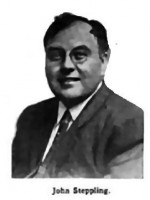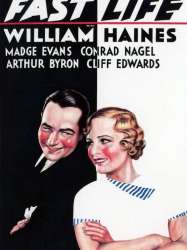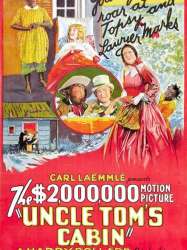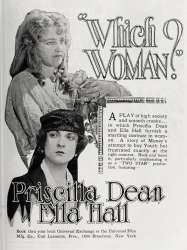The Reckless Age is a american film of genre Drama directed by Harry A. Pollard released in USA on 16 august 1924 with Reginald Denny
The Reckless Age (1924)

If you like this film, let us know!
- Infos
- Casting
- Technical infos
- Photos
- Videos
- Film quotes
- Characters
- Music
- Awards
The Reckless Age is a 1924 silent film comedy-drama directed by Harry A. Pollard and starring Reginald Denny. It was produced and distributed by Universal Pictures. It is based on the novel Love Insurance by Earl Derr Biggers and is a remake of an earlier Paramount film Love Insurance(1919) now lost.
This film is preserved at Filmmuseum Amsterdam.
Actors

Reginald Denny
(Dick Minot)

Ruth Dwyer
(Cecilia Meyrick)

John Steppling
(Spencer Meyrick)

May Wallace
(Tante Meyrick)

William Austin
(Lord Allan Harrowby)
Comments
Leave comment :
Suggestions of similar film to The Reckless Age
There are 135 films with the same actors, 16 films with the same director, 89482 with the same cinematographic genres (including 3891 with exactly the same 3 genres than The Reckless Age), to have finally 70 suggestions of similar films.If you liked The Reckless Age, you will probably like those similar films :

The Leather Pushers (1922)
Directed by Harry A. Pollard, Malcolm St. Clair, Edward Laemmle
Origin USA
Genres Drama
Actors Reginald Denny, Edgar Kennedy, Norma Shearer
Rating62%






Oh, Doctor! (1925)
Directed by Harry A. Pollard
Origin USA
Genres Comedy
Actors Reginald Denny, Mary Astor, Otis Harlan, William V. Mong, Tom Ricketts, Lucille Ward
Rating60%





Rufus Billops, son of wealthy parents, has been reared to manhood in the belief that he is delicate and ill. He inherits a huge fortune which is tied up so that for some years he will have only a small income. Needing coin, he borrows from three elderly loan-sharks who wish him to live long enough to obtain his principal. They supply inspiration in the form of a beautiful nurse. Rufus falls in love with her and finding that she admires daring men, he does some reckless stunts that cause his creditors to almost die from anxiety. Dolores, the nurse, schemes out a plan to gain the release of his fortune from the lenders, and Rufus finally wins her affection.

Shipmates (1931)
, 1h12Directed by Harry A. Pollard
Origin USA
Genres Drama, Comedy, Romance
Actors Robert Montgomery, Ernest Torrence, Dorothy Jordan, Hobart Bosworth, Cliff Edwards, Gavin Gordon
Rating55%






Fast Life (1932)
, 1h22Directed by Harry A. Pollard
Origin USA
Genres Comedy, Romantic comedy, Action, Romance
Themes Seafaring films, Sports films, Transport films
Actors William Haines, Madge Evans, Conrad Nagel, Arthur Byron, Cliff Edwards, Warburton Gamble
Rating59%





Two people leave the US Navy after having served ten years as a sailor. Sandy is one of them and later invents a carburetor that should increase the speed that powered boats will run. When testing it, he accidentally sinks a boat and has to pay for it. Now he is broke and enters a boat contest. To win, he has to invent the fastest boat in the world.

Show Boat (1929)
, 2h9Directed by Harry A. Pollard
Origin USA
Genres Drama, Musical, Romance
Themes Théâtre, Musical films, Films based on plays, Films based on musicals
Actors Laura La Plante, Joseph Schildkraut, Emily Fitzroy, Otis Harlan, Stepin Fetchit, Alma Rubens
Rating60%





The eighteen-year-old Magnolia meets, falls in love with, and elopes with riverboat gambler Gaylord Ravenal.

Uncle Tom's Cabin (1928)
, 2h24Directed by Harry A. Pollard
Origin USA
Genres Drama
Themes Films about slavery, Films about racism
Actors Margarita Fischer, Rondo Hatton, George Siegmann, James B. Low, Arthur Edmund Carewe, Eulalie Jensen
Rating67%





L'Oncle Tom et Eliza sont tous deux esclaves de la même maison dans le Kentucky.

The Cohens and Kellys (1926)
, 1h20Directed by Harry A. Pollard
Origin USA
Genres Comedy
Actors Charles Murray, Kate Price, Jason Robards Sr., Olive Hasbrouck, Nat Carr
Rating62%





As articulated in the Nichols case, The Cohens and The [sic] Kellys presents two families, Jewish and Irish, living side by side in the poorer quarters of New York in a state of perpetual enmity. The wives in both cases are still living, and share in the mutual animosity, as do two small sons, and even the respective dogs. The Jews have a daughter, the Irish a son; the Jewish father is in the clothing business; the Irishman is a policeman. The children are in love with each other, and secretly marry, apparently after the play opens. The Jew, being in great financial straits, learns from a lawyer that he has fallen heir to a large fortune from a great-aunt, and moves into a great house, fitted luxuriously. Here he and his family live in vulgar ostentation, and here the Irish boy seeks out his Jewish bride, and is chased away by the angry father. The Jew then abuses the Irishman over the telephone, and both become hysterically excited. The extremity of his feelings makes the Jew sick, so that he must go to Florida for a rest, just before which the daughter discloses her marriage to her mother. On his return, the Jew finds that his daughter has borne a child; at first he suspects the lawyer, but eventually learns the truth and is overcome with anger at such a low alliance. Meanwhile, the Irish family who have been forbidden to see the grandchild, go to the Jew's house, and after a violent scene between the two fathers in which the Jew disowns his daughter, who decides to go back with her husband, the Irishman takes her back with her baby to his own poor lodgings. The lawyer, who had hoped to marry the Jew's daughter, seeing his plan foiled, tells the Jew that his fortune really belongs to the Irishman, who was also related to the dead woman, but offers to conceal his knowledge, if the Jew will share the loot. This the Jew repudiates, and, leaving the astonished lawyer, walks through the rain to his enemy's house to surrender the property. He arrives in great dejection, tells the truth, and abjectly turns to leave. A reconciliation ensues, the Irishman agreeing to share with him equally. The Jew shows some interest in his grandchild, though this is at most a minor motive in the reconciliation, and the curtain falls while the two are in their cups, the Jew insisting that in the firm name for the business, which they are to carry on jointly, his name shall stand first.

Poker Faces (1926)
, 1h20Directed by Harry A. Pollard
Origin USA
Genres Comedy
Actors Laura La Plante, Edward Everett Horton, George Siegmann, Tom Ricketts, Dorothy Revier
Rating69%






The Danger Game (1918)
, 50minutesDirected by Harry A. Pollard
Origin USA
Genres Comedy
Actors Madge Kennedy, Tom Moore, Joseph Schildkraut, Mabel Ballin
Rating65%






Which Woman? (1918)
, 50minutesDirected by Tod Browning, Harry A. Pollard
Origin USA
Genres Drama, Crime
Actors Ella Hall, Priscilla Dean, A. Edward Sutherland, Marian Skinner
 Connection
Connection